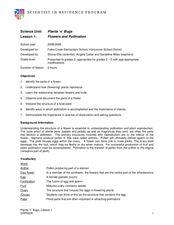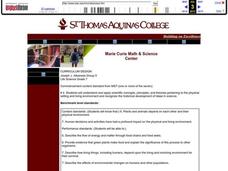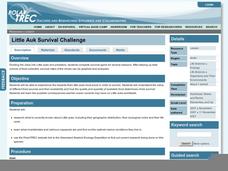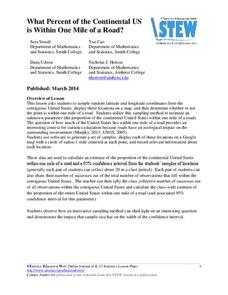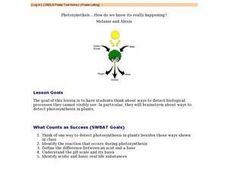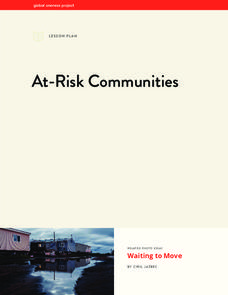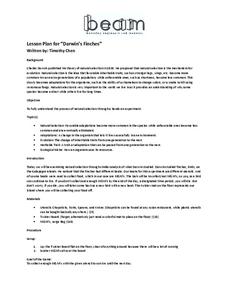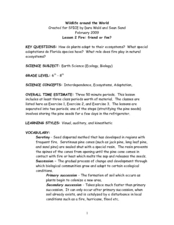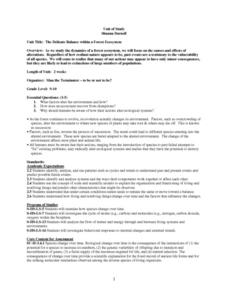Curated OER
Wildlife Habitat
Students examine habitats and describe their elements. In this wildlife habitat instructional activity students study the factors that affect habitat and write a short report.
Curated OER
Flowers and Pollination
Students explore the environment by researching plant reproduction. For this pollination lesson, students define botany related vocabulary terms such as disc flower, petal and fertilization. Students dissect a flower with their...
Curated OER
The Aftermath
High schoolers examine photographs of the attack on Pearl Harbor. They discuss the damage that occured on December 7, 1941. They debate whether the attack was a success or not for the Japanese.
Curated OER
Pharaoh Mountain Hike: Investigating Adirondack Life Zones
Students hike a local mountain and examine its life zones. They measure various components at each zone and collect leaf litter at the sites. At the mountain top, students make descriptive observations and complete a handout about the...
Cornell University
Center for Teaching Excellence (Syllabus Template)
Need a model for a college level course syllabus? Here's a good one. The editable template provided by this resource not only indicates key information that should be supplied, but also includes models for how various policies can be...
Curated OER
Plants and Animals
Seventh graders discover the interconnectedness of plants and animals in ecosystems. In groups, they create a food web and discuss the problems when one link of the chain is broken. To end the lesson, they set up a balanced environment...
Curated OER
Little Auk Survival Challenge
A bird's life is one of danger and intrigue as it struggles for survival in sometimes harsh environments. To understand how difficult surviving in the wild can be, children play a simulation game where they act as little auks, birds from...
The New York Times
Trouble in the Hive: Researching the Decimation of Honeybee Colonies
Teach your class about colony collapse disorder and foster discussion about causes and solutions for the honeybee problem. Class members read and discuss an article and participate in one of two detailed activities about pollination and...
EnLiST
Trap Your Own Insects: What’s in Your Backyard?
Young entomologists construct three types of insect traps—pitfall, pollinator, and panel—before setting their traps out and observing what they caught. They then observe what types of insects the different traps attract.
Statistics Education Web
What Percent of the Continental US is Within One Mile of a Road?
There are places in the US where a road cannot be found for miles! The lesson asks learners to use random longitude and latitude coordinates within the US to collect data. They then determine the sample proportion and confidence interval...
Curated OER
Photosynethsis....How do we know it's really happening? - Biology Teaching Thesis
Students think of one way to detect photosynthesis in plants besides those ways shown in class. They identify the reaction that occurs during photosynthesis. Students define the difference between an acid and a base. They identify acidic...
Curated OER
Visual Vocabulary
Students interpret and name the vocabulary termed acted out by the mime. In this science/language arts/physical education lesson, students are given a set of vocabulary terms to discuss within their group. Next, students place all...
Teach Engineering
Designing a Sustainable Guest Village in the Saguaro National Park
Brainstorm ideas to design a sustainable guest village in the Sonoran Desert. The first installment of a nine-part unit teaches young environmental scientists about the basics of the Saguaro National Park and about sustainable design....
Global Oneness Project
At-Risk Communities
"Waiting to Move," a photo essay by Ciril Jazbec, brings into sharp focus the threats posed by climate change. Class members examine images of Shishmaref Island and the Native Alaskan Inupiate coastal villages that are impacted by rising...
Curated OER
Smokey's Message
Learners list and discuss positive and negative effects of wildland fire. They discuss relationships among ecosystems and fire. They participate in role-playing activities related to wildland fire management.
Berkeley Engineering and Mentors
Darwin's Finches
Try a twist on the old finch beak and chopsticks activity by using M&Ms on a Twister mat. Spoons, knives, forks, and chopsticks represent beaks and are randomly assigned to your little birds, who must collect as much food as possible...
Curated OER
Population Biology
Young scholars define the following terms: predation, competition, carrying capacity and population. They can explain the patterns of growth and the limitations of growth. Students explain the difference between density-dependent and...
Curated OER
Wildlife Around the World
Students examine how plants are able to adapt to their ecosystem and the role that fire plays in changes through the years. In this ecosystem lesson students complete several exercises focussing on plants and their adaptations to.
Curated OER
The Delicate Balance within a Forest Ecosystem
Students examine the causes and effects of alterations in a forest ecosystem and evaluate how human actions may only seem to have minor consequences, but can lead to extinctions of large numbers of populations. Students produce an...
Curated OER
Asexual versus Sexual Reproduction
Students explore reproduction. They research organisms and groups of organisms to determine whether they reproduce sexually or asexually. In addition, they determine the organism's habitat.
Curated OER
The Salt Water Connection
Students investigate the various factors that influence the Pacific Ocean and Monterey Bay, California. They watch a video about Monterey Bay and take notes, and conduct research and write a report about a specific organism living in...
Curated OER
I See a Coyote
Students role-play coyotes looking for natural resources. In this natural resources lesson, students examine the relationship between animal life and the environment. Students play a game that demonstrates how natural resources affect...
Curated OER
COMPOSTING: WHY BOTHER?
Students explore the composting process and participate in a contest to make the most compost the fastest from the school's kitchen and yard waste.
Curated OER
Something Fishy - Bioaccumulation of Mercury
Young scholars explore the dangers of eating high levels of mercury and how small amounts of mercury in water accumulate in greater quantities in organisms higher in the food chain. They list the health of effects of high levels of...
Other popular searches
- Ecological Succession Stages
- Ecological Succession Biome
- Ecological Succession Humans
- Ecological Succession Food
- Ecological Succession Test
- Ecological Succession Bio Me



